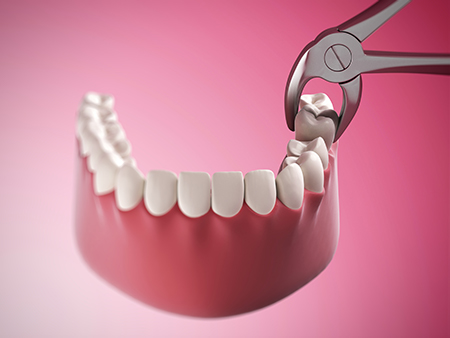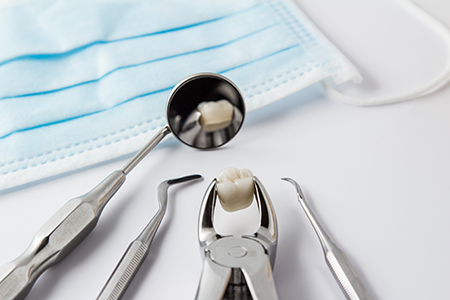
Our Office
Visit Us Online

Your comfort and long-term oral health guide every decision when a tooth needs to be removed. At Frankford Dental Group, we prioritize clear communication and careful planning so you know why an extraction is recommended and what the steps will be. Our team focuses on preserving teeth when possible, but when removal is the safest option, we walk patients through the process from evaluation to aftercare.
An extraction can be a straightforward solution for a variety of dental problems — from a retained primary tooth that blocks normal development to a tooth damaged beyond repair. We tailor recommendations to each patient’s overall health, dental goals, and the complexity of the situation so you receive treatment that balances safety with long-term function.
Before any procedure, your provider will review your medical and dental history, discuss anesthesia and comfort options, and explain replacement choices when appropriate. Understanding the reasons and the recovery expectations helps reduce anxiety, supports better outcomes, and sets the stage for a smooth healing period.
Primary (baby) teeth that won’t fall out or are severely decayed
Sometimes a baby tooth remains firmly in place even as the permanent tooth below begins to develop. If the primary tooth’s roots fail to resorb or it becomes fused to the bone, it can interfere with normal eruption and alignment. Removing an over-retained primary tooth can help the permanent tooth emerge correctly and protect future orthodontic development.
Permanent teeth with extensive decay that cannot be restored
When decay progresses past the point where fillings, crowns, or root canal therapy can reliably restore structure and function, extraction becomes the safest option. Removing the damaged tooth prevents ongoing infection and helps protect neighboring teeth and gum tissue.
Teeth fractured or broken beyond repair
Severe cracks or breaks that compromise the tooth’s structure or root may make long-term restoration impractical. In these situations, extraction prevents persistent pain and infection and allows for planning how best to restore chewing function and aesthetics afterwards.
Advanced periodontal disease that weakens support
Chronic gum disease can erode the bone and soft tissues that hold teeth in place. When support is severely compromised and a tooth becomes loose or a source of infection, removal is sometimes necessary to preserve overall oral health and to prevent spread of disease.
Wisdom teeth that are impacted, decayed, or poorly positioned
Third molars commonly lack the room to erupt properly. When they are impacted, cause crowding, damage adjacent teeth, or develop infections, timely extraction can prevent discomfort and more serious problems in the future.
Extractions as part of orthodontic planning
In some orthodontic cases, selectively removing one or more permanent teeth creates the space needed to align the remaining teeth and achieve a balanced bite. These decisions are made carefully with input from the orthodontist and your dental team to support both function and appearance.

An extraction begins with a thorough clinical exam and appropriate imaging to evaluate the tooth, its roots, and surrounding structures. We use digital radiographs as needed to look for root shape, proximity to nerves or sinuses, bone levels, and signs of infection. That information steers whether a simple removal will suffice or if a surgical approach is required.
Your health history and medications are critical to planning. Certain conditions or medications may require adjustments, antibiotic coverage, or medical clearance from your physician. We’ll review your current medications, allergies, and any relevant medical diagnoses so we can take appropriate precautions and schedule care safely.
Comfort and anxiety management are also discussed before treatment. Local anesthesia is standard for extractions, and for patients who experience anxiety or need more profound relaxation, we can discuss additional options in dental sedation. Clear preoperative instructions will be provided so you can prepare the day of your appointment and know what to expect after the procedure.
A simple extraction applies when the tooth is fully visible in the mouth and the root anatomy is favorable. After the area is numb, the dentist will loosen the tooth by releasing its ligaments and then remove it with forceps. The procedure is typically quick, and most patients experience minimal discomfort during the appointment thanks to effective local anesthesia.
Following removal, we place gauze to help form a stable blood clot and provide instructions on how to manage bleeding, swelling, and activity. Most simple extractions heal uneventfully within a week to ten days, though complete bone and soft tissue remodeling continues over several months.
Surgical extractions are used for teeth that are broken at or below the gum line, ankylosed, or impacted beneath the bone. These procedures may involve a small incision in the gum tissue and, when necessary, precise removal of bone around the tooth to allow safe extraction. Complex cases are sometimes referred to an oral and maxillofacial surgeon for specialized care.
Even with surgical removal, local anesthesia is used to control pain, and we talk through sedation and aftercare options beforehand. Because surgical extractions can be more involved, the team will schedule follow-up visits and give more detailed care instructions to support optimal healing and reduce the risk of complications.

Recovery looks different for each person, but basic principles help everyone heal efficiently. After your appointment you’ll receive clear, written post-operative directions covering pain management, activity level, oral hygiene, and dietary recommendations. Following these guidelines helps protect the healing site and reduces the likelihood of complications like dry socket or infection.
Expect some bleeding, discomfort, and swelling for the first 24–72 hours. These symptoms are usually manageable with prescribed or over-the-counter medications and home-care measures. We recommend planning light activity and arranging transportation for surgical appointments or when sedation is used.
If your treatment plan includes replacing the missing tooth, we’ll discuss timing and options — such as temporary appliances, fixed bridges, or implant solutions — so you understand the next steps toward restoring function and appearance.
Apply and maintain gauze pressure
Right after the procedure, gently bite on the provided gauze pad to encourage clotting. Change the pad as directed and continue light pressure if bleeding persists. A small amount of oozing is normal for up to 24 hours; contact us if bleeding remains heavy or uncontrolled.
Protect numb tissues
Until numbness fully wears off, avoid chewing, hot beverages, or touching the area to prevent accidental biting of your lips, tongue, or cheek.
Follow medication directions
Antibiotics:
If prescribed, complete the full course exactly as instructed to reduce the risk of infection.
Pain control:
Taking a recommended pain reliever before the anesthesia fades can improve comfort. Use any prescription medication only as directed and follow our guidance for over-the-counter options.
Avoid disturbing the clot
Do not rinse vigorously, spit, or use straws for the first day or two after surgery — these activities can dislodge the clot and delay healing.
Manage swelling with ice
Apply an ice pack in short intervals during the first 24 hours to minimize facial swelling. Heat can be helpful later in the recovery period if stiffness persists.
Refrain from smoking
Smoking inhibits clot stability and tissue healing. Avoid tobacco products for at least one week after an extraction to support optimal recovery.
Choose soft foods and adequate fluids
Start with cool, soft foods and avoid hot, spicy, or acidic items in the immediate days after surgery. Stay hydrated, but avoid carbonated or alcoholic beverages while you’re healing.
Maintain gentle oral hygiene
Brush and floss other areas as usual, but be gentle near the extraction site. After 24–48 hours, a mild warm saltwater rinse can help keep the mouth fresh without disturbing the clot.
Keep any scheduled follow-up
If sutures were placed or a complex extraction performed, a follow-up visit will help us confirm proper healing and address any concerns. Please attend that appointment as instructed.
If you notice worsening pain, increased swelling, persistent bleeding, fever, or any other unexpected symptoms, contact our team so we can evaluate and guide your next steps.

Our approach combines careful diagnosis, patient-centered communication, and options that align with long-term oral health goals. When an extraction is necessary, we focus on minimizing discomfort, protecting surrounding tissues, and planning for the best possible restoration when appropriate. You can expect a clear explanation of alternatives, risks, and the timeline for recovery and replacement options.
When replacement is part of the plan, we talk through choices such as dentures, fixed bridges, and dental implants so you can make an informed decision that considers function, aesthetics, and oral health preservation. Our team coordinates care and referrals when specialty services are recommended to ensure continuity and quality.
Ultimately, the goal is to restore comfort, protect your smile, and support long-term function. We take time to answer questions, provide clear aftercare instructions, and monitor healing so you feel confident throughout the treatment process.
If you’d like more information about tooth extractions or whether removal is the right choice for you, please contact us for a consultation.
The most common reasons for tooth loss include advanced periodontal disease, extensive tooth decay, and facial trauma. According to statistics, gum disease is responsible for close to 70% of tooth loss in adults. Although less frequent than the preceding three reasons, it should also be noted that specific diseases, drugs, smoking, and poor nutrition contribute to the risk of tooth loss.
The Centers for Disease Control and Prevention report that in the United States, an average of 12 teeth (including the wisdom teeth) are lost by the age of 50. Also, 26% of adults between 65 and 74 years of age have lost all their teeth.
Every patient and every situation is different. However, when a tooth and the surrounding tissues are numbed with a local anesthetic, you should only expect to feel a bit of pressure, but no pain as the tooth is being loosened from the surrounding tissues and extracted. For patients who are apprehensive and for some surgical extractions, our office will discuss our options in dental sedation to provide further relaxation and reduce any sense of discomfort.
While it's normal to feel some tenderness and swelling following an extraction, the degree of these sensations can vary. It mostly depends on the complexity of the extraction and the body's response to the procedure. We'll recommend or prescribe the appropriate pain medication to help ensure your comfort and give you specific instructions for maximum effectiveness and safety.
Typically, the recovery period following a simple extraction is shorter than a surgical extraction. However, a patient's overall health, habits, the size and location of the tooth, and other variables can influence recovery and healing. To speed up the recovery and avoid any complications, patients must follow the given at-home instructions diligently. We'll carefully review what to expect following your procedure and go over your post-op instructions.
Smoking interferes with blood clot formation, which is an essential first step in the healing process. Blood clot formation not only provides a protective layer to cover the underlying exposed bone and nerve endings, but it also supports the growth of new tissue. Cigarette smoke also contains chemical toxins that can disrupt the healing process and lead to problems such as continued inflammation, infection, or dry socket.
In a very small percentage of cases, a condition known as dry socket can develop in the aftermath of a dental extraction. This painful condition can arise when the blood clot in the extraction site doesn't form properly or gets dislodged. With dry socket, you may experience throbbing pain and symptoms such as bad breath and an unpleasant taste in your mouth. As skilled providers of care, our office will provide immediate treatment to alleviate your discomfort and promote healing.
The last teeth in your mouth to develop, wisdom teeth often do not have enough room to fully erupt or may be positioned in the wrong direction. These issues can affect your dental health as well as overall wellbeing. While some individuals never develop all their wisdom teeth, and a few have sufficient space for them, there are many people with partially or fully impacted third molars. Our office will monitor the development, position, and health of your wisdom teeth and will advise you if and when extractions are indicated.
After a tooth is removed, bone-grafting material is sometimes placed in the socket to promote healing and encourage new bone development. This procedure is often performed to support the eventual and successful placement of a dental implant.
At the office of Frankford Dental Group, we strive to make dental care affordable and accessible. Depending on the type or complexity of the extraction and other variables, the cost of the procedure can vary. Based on our diagnostic findings, our office will inform you of the healthiest choices in care, explain the fees, discuss insurance coverage, and explain your payment options.
Many dental plans offer some level of coverage for tooth extractions. We'll advise you if your plan covers the full cost of the procedure and if there is any out-of-pocket expense. Our business office will work with you to maximize your insurance benefits as much as possible while helping you minimize any out-of-pocket expenses.
A tooth extraction is the removal of a tooth from its socket in the jaw. The procedure is performed when a tooth cannot be preserved safely with restorative or endodontic treatment. Extractions vary in complexity, and your provider will explain the method chosen based on the tooth’s condition and position.
Local anesthesia is commonly used so patients feel pressure rather than pain during the appointment. After the tooth is removed, gauze helps form a stable clot and the team will review immediate aftercare steps. Follow-up instructions cover bleeding control, oral hygiene, diet, and activity to support uncomplicated healing.
Extraction may be recommended when a tooth is extensively decayed, fractured beyond repair, or contributing to chronic infection that threatens surrounding teeth. Teeth with advanced periodontal disease that have lost supporting bone or severely impacted wisdom teeth that cause pain or crowding are also common reasons for removal. The decision is made after evaluating how well the tooth can be restored and how extraction supports long-term oral health.
In some cases extractions are part of orthodontic or surgical treatment plans to create space or remove obstructive primary teeth. Your provider will discuss alternatives, risks, and expected outcomes so you understand why extraction is the most appropriate choice. Treatment is always individualized to balance patient health, function, and future restorative plans.
Evaluation begins with a clinical exam and imaging to assess root anatomy, bone levels, and proximity to nerves or sinuses. Medical history and current medications are reviewed because certain conditions or drugs may require precautions, antibiotic coverage, or clearance from a physician. This comprehensive assessment informs whether a simple or surgical approach is safest and whether any special measures are needed.
Our team uses digital radiographs and diagnostic tools to plan access and minimize risks to adjacent structures. We also discuss anesthesia and anxiety-management options so patients know what to expect during the procedure. Clear preoperative instructions are provided to prepare patients for the day of treatment and the recovery period.
A simple extraction applies when the tooth is fully visible in the mouth and can be removed with forceps after the area is anesthetized. These procedures are typically quick and involve loosening the tooth’s ligaments before removal. Recovery is often straightforward with routine post-operative instructions for clot protection and gentle oral care.
A surgical extraction is required when a tooth is broken at or below the gum line, impacted, or ankylosed to the bone; it may involve an incision and limited bone removal. Surgical cases can be more involved and may require sutures and scheduled follow-up to monitor healing. For complex situations, the practice coordinates with specialists such as oral and maxillofacial surgeons to ensure the best outcome.
Prior to the appointment, share your complete medical history, current medication list, and any allergies so the team can take appropriate precautions. Follow any instructions about fasting or medication adjustments if sedation or general anesthesia will be used, and arrange transportation home when sedation is planned. Clear communication about your health and comfort preferences helps the provider tailor the plan to your needs.
On the day of treatment, wear comfortable clothing and avoid smoking or using alcohol. Plan to rest and limit strenuous activity for at least 24–48 hours after the procedure, and have soft foods and ice available at home to manage initial swelling and comfort. If you have questions about preparation, call the office before your appointment for clarification.
Local anesthesia is the standard method to numb the area and prevent pain during an extraction, and most patients tolerate the procedure well with numbness and minimal discomfort. For anxious patients or more complex surgical cases, additional options such as nitrous oxide or oral/intravenous sedation can provide deeper relaxation and reduced awareness. The choice of technique is based on the patient’s medical history, anxiety level, and the complexity of the extraction.
Your provider will explain the risks and benefits of each option and obtain informed consent before proceeding. When sedation is used, specific pre- and post-operative instructions will be provided, including the need for a responsible adult to accompany you and drive you home. Safety protocols and monitoring are followed to ensure a controlled and comfortable experience.
During the first 24–72 hours expect some bleeding, swelling, and discomfort that gradually improves with time and proper care. Managing bleeding with gauze, controlling swelling with intermittent ice, and following medication guidance help control symptoms and support healing. Most patients see substantial improvement within a few days, though complete tissue remodeling continues over several weeks to months.
Maintain gentle oral hygiene, avoid disturbing the clot, and follow dietary recommendations such as soft, nonirritating foods in the immediate recovery period. Attend any scheduled follow-up visits so the team can check the site and remove sutures if used. Contact the office promptly if you experience worsening pain, excessive bleeding, fever, or other concerning symptoms.
Effective pain control often includes a combination of prescribed medications and over-the-counter analgesics used as directed; taking a recommended pain reliever before anesthesia wears off can improve comfort. Apply ice to the face in short intervals during the first 24 hours to limit swelling, then use warm compresses later if stiffness persists. Avoid smoking, forceful rinsing, and using straws in the first few days to protect the clot and reduce the risk of dry socket.
Keeping the mouth clean with gentle brushing and, after 24–48 hours, mild warm saltwater rinses helps prevent infection without disturbing healing tissue. If antibiotics are prescribed, complete the full course exactly as directed to diminish infection risk. Reach out to the dental team right away if you suspect a complication so it can be evaluated and treated promptly.
Replacement options include temporary appliances, fixed bridges, and dental implants; the best choice depends on the tooth’s location, bone health, and your long-term goals for function and appearance. In many cases clinicians wait for initial healing before starting definitive restorative work to ensure optimal tissue stability and implant integration when applicable. The treatment timeline is individualized and planned with attention to both short-term comfort and durable long-term results.
Your dentist will discuss the pros and cons of each option, including timing, surgical considerations for implants, and the impact on adjacent teeth and bite. Coordinated planning between general dentists and specialists helps streamline care and produce predictable outcomes. If you have specific restorative goals, bring those concerns to the consultation so the team can develop a tailored plan.
Granger Dentistry emphasizes careful diagnosis, clear communication, and patient-centered planning to ensure extractions are performed safely and with minimal discomfort. The team uses modern imaging, proven clinical techniques, and coordinated care pathways to manage both routine and complex cases, referring to specialists when additional expertise is beneficial. Our approach focuses on preserving oral health, protecting surrounding tissues, and preparing for appropriate restoration when a tooth is removed.
Patients receive detailed pre- and post-operative instructions and accessible follow-up so healing can be monitored and concerns addressed quickly. By combining clinical experience with attention to comfort and education, the practice aims to make the extraction process as predictable and stress-free as possible. If you have questions about the procedure or recovery, the office will provide clear guidance tailored to your situation.
Available after hours by appointment.
